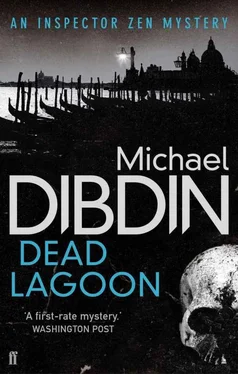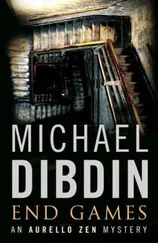Michael Dibdin - Dead Lagoon
Здесь есть возможность читать онлайн «Michael Dibdin - Dead Lagoon» весь текст электронной книги совершенно бесплатно (целиком полную версию без сокращений). В некоторых случаях можно слушать аудио, скачать через торрент в формате fb2 и присутствует краткое содержание. Жанр: Полицейский детектив, на английском языке. Описание произведения, (предисловие) а так же отзывы посетителей доступны на портале библиотеки ЛибКат.
- Название:Dead Lagoon
- Автор:
- Жанр:
- Год:неизвестен
- ISBN:нет данных
- Рейтинг книги:5 / 5. Голосов: 1
-
Избранное:Добавить в избранное
- Отзывы:
-
Ваша оценка:
- 100
- 1
- 2
- 3
- 4
- 5
Dead Lagoon: краткое содержание, описание и аннотация
Предлагаем к чтению аннотацию, описание, краткое содержание или предисловие (зависит от того, что написал сам автор книги «Dead Lagoon»). Если вы не нашли необходимую информацию о книге — напишите в комментариях, мы постараемся отыскать её.
Dead Lagoon — читать онлайн бесплатно полную книгу (весь текст) целиком
Ниже представлен текст книги, разбитый по страницам. Система сохранения места последней прочитанной страницы, позволяет с удобством читать онлайн бесплатно книгу «Dead Lagoon», без необходимости каждый раз заново искать на чём Вы остановились. Поставьте закладку, и сможете в любой момент перейти на страницу, на которой закончили чтение.
Интервал:
Закладка:
‘It’s not just rhetoric, and you know it! Do you want a Europe that is like an airport terminal where every language is spoken badly, where any currency is accepted but there is nothing but soulless trash to buy and fake food to eat? You don’t! You can’t!’
‘Neither do I want one where politicans conspire to commit criminal offences aided and abetted by corrupt policemen in the pay of the local mob.’
Dal Maschio shrugged.
‘You probably won’t believe me, but I swear I never had the slightest notion that Gavagnin was involved with a drugs racket. That was another part of his life altogether. He didn’t confide in me and I didn’t pry. In any case, given that there’s a market in illicit drugs, why should the Sicilians make all the money? No, I’m only joking…’
Zen regarded him bleakly.
‘I think you’d better go.’
Dal Maschio glanced at his watch and began to button up his coat.
‘Sooner or later you’re going to have to choose, Zen. The new Europe will be no place for rootless drifters and cosmopolitans with no sense of belonging. It will be full of frontiers, both physical and ideological, and they will be rigorously patrolled. You will have to be able to produce your papers or suffer the consequences.’
He leant towards Zen, almost whispering.
‘There can be no true friends without true enemies. Unless we hate what we are not, we cannot love what we are. These are the old truths we are painfully rediscovering after a century and more of sentimental cant. Those who deny them deny their family, their heritage, their culture, their birthright, their very selves! They will not lightly be forgiven.’
He walked out of the room and downstairs. Zen stood quite still, listening intently to the clatter of Dal Maschio’s footsteps as though they were a message telling him what to do next. The slam of the front door seemed to release him from this act of attention. He strode to the landing and grabbed his coat and hat.
Outside, the wind had freshened. It skittered about the courtyard, banking off the angled walls and blowing back from fissures barely wide enough to sidle down. At the far end of the street leading towards the Cannaregio a man could be seen emerging from the shadows into the cone of yellow light cast by a streetlamp. Zen jammed his hat firmly on his head and set off in the same direction, the hem of his coat billowing about him.
Dal Maschio kept up a brisk pace until he reached the lighted thoroughfare crowded with commuters heading for the station. Here he slowed to a relaxed but still purposeful stride which allowed him to respond in the appropriate way to the many greetings he received. For a privileged few he paused long enough to exchange a few remarks and slap a shoulder playfully, but most received no more than a smile and a nod acknowledging their existence but indicating that he was a busy and important man who could not be expected to recognize everyone who recognized him.
Zen adjusted the distance between them to take account of the situation, closing in as the crowds became thicker, falling back again as they crossed the Scalzi bridge and entered the relatively deserted streets beyond. Here Dal Maschio was accosted less often, but he nearly always stopped to speak. An area like Santa Croce, with its ugly tenements, failing shops and ageing population, was the heartland of the Nuova Repubblica Veneta, and its leader could not afford to leave anyone feeling slighted or ignored.
Thanks to these constant interruptions it was another twenty minutes before they emerged into the sweeping vistas of Campo Santa Margherita. Dal Maschio strode the length of the square, past the row of plane trees tossing their branches in the wind and the isolated market house with its ancient sign listing the minimum legal length for each type of fish that could be sold there. Here he veered right, towards the church of the Carmelites, and turned in under a sottoportego bearing an almost illegible sign dating from the war, a stencilled yellow arrow beneath the word PLATZKOMMANDANT.
Zen turned back, seeking somewhere to wait and watch. There was only one bar still open, a dingy wineshop thick with tobacco smoke and the sound of vigorous sparring in the local dialect. A number of figures were dimly visible in the dull fumed light, both male and female, all far gone in years and drink. They turned to gaze at Zen as he made his way to a table by the window. This vetting concluded, most of them resumed their previous heated exchanges, taking no further notice of the newcomer, but one couple continued to watch him.
Zen shot them a glance as he sat down. The man he recognized as Andrea Dolfin, but the woman — adrift and becalmed somewhere in her sixties — he had never seen before, although something about her looked familiar. The proprietor, a burly man with the air of someone who had seen every kind of trouble, and seen it off, marched over to Zen’s table and asked what he’d like, in a tone which suggested that he’d also like to know what the hell he was doing there. Zen ordered a caffe corretto alla grappa. Lowering the net curtain which covered the bottom half of the window, he assured himself that the entrance into which Dal Maschio had disappeared was visible from where he was sitting.
When he turned back to the lighted room, Dolfin and the woman were still staring at him and talking quietly together in a furtive undertone. The old man pointed at him, without making the slightest attempt to disguise the fact. He murmured something to the woman, who smiled in a sad, absent way. Zen turned back to the window, knowing that the gesture was an evasion. No one would be leaving the meeting on the other side of the square for at least an hour. When he looked back, the two pairs of eyes were still gazing in his direction.
After all Zen had been through that day, this insolent scrutiny was the last straw. If even half of what Ada Zulian had hinted at was true, Andrea Dolfin ought to be afraid to show his face in public, never mind mock the police. Having been betrayed by Cristiana and humiliated by Ferdinando Dal Maschio, he wasn’t in a mood to take any insolence from Andrea Dolfin. Rising to his feet, he crossed the foggy expanses of the bar towards his tormentor.
‘What the hell are you laughing at?’
Dolfin looked up with a slight frown, as though noticing Zen for the first time.
‘A joke,’ he said.
‘At my expense, apparently.’
Dolfin shrugged.
‘Not in particular, dottore. On the other hand, we’re none of us exempt.’
Zen sat down and looked the old man in the eyes.
‘It doesn’t surprise me that you only come out after dark,’ he hissed. ‘After what Ada Zulian told me this afternoon, I wonder you have the nerve to go on living at all.’
‘The more I see of life, the more I wonder that any of us do.’
The proprietor brought Zen his coffee.
‘Everything all right, Andrea?’ he asked, glancing suspiciously at Zen.
‘Fine, fine.’
Zen swallowed the coffee down at one gulp.
‘Do you want me to tell you what she said?’
Dolfin smiled broadly.
‘I’ve heard it many times before. Ada never made any secret of her views. On the contrary.’
The man’s complacent tone infuriated Zen. He pointed to the woman sitting beside Dolfin.
‘What about your lady friend? Does she know? Do you want me to tell her what Ada has to say about you and her daughter?’
Andrea Dolfin gazed back at him calmly.
‘Why not?’
He stroked the woman’s ravaged face with the back of his fingers.
‘I don’t think you two know each other, by the way. This is Aurelio Zen, my dear. He claims to be the son of Angelo Zen, the railwayman, although I’d always understood that Angelo’s only child was born dead.’
Читать дальшеИнтервал:
Закладка:
Похожие книги на «Dead Lagoon»
Представляем Вашему вниманию похожие книги на «Dead Lagoon» списком для выбора. Мы отобрали схожую по названию и смыслу литературу в надежде предоставить читателям больше вариантов отыскать новые, интересные, ещё непрочитанные произведения.
Обсуждение, отзывы о книге «Dead Lagoon» и просто собственные мнения читателей. Оставьте ваши комментарии, напишите, что Вы думаете о произведении, его смысле или главных героях. Укажите что конкретно понравилось, а что нет, и почему Вы так считаете.











